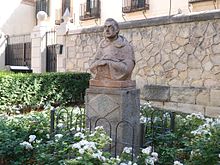Domingo de Soto

Dominico de Soto OP (* 1494 in Segovia ; † November 15, 1560 in Salamanca ; Spanish Domingo de Soto ) was a Spanish Dominican , teacher of theology at the University of Alcalá , confessor of Charles V and a leading exponent of late Spanish scholasticism ( school from Salamanca ).
Life
Domingo came from a humble background, worked as a sacristan and then studied theology and philosophy , first at the University of Alcalá , then at the Sorbonne . In 1524 he entered the Dominican order in Burgos and taught philosophy at the Dominican University in Segovia and later theology at the University of Salamanca , where he received the Summa theologiae of St. Thomas Aquinas commented.
From 1545 to 1547 Domingo was Charles V's theologian and representative of the Dominican Order at the Council of Trent , where he learned the doctrine of justification of St. Thomas represented and evolved in relation to the relationships of divine grace and human freedom. He became the emperor's confessor, but refused to be appointed bishop of Segovia and instead returned to his monastery, where he was elected prior by the convent in 1550 . From 1552 until his death he taught again at the University of Salamanca.
In addition to his theological work, he was particularly committed to the Dominican ideal of poverty and also to the rights of the poor. In a disputation with the Infante Philip , he defended the right of the poor to self-determination and was involved in the disputation of Valladolid on the side of Bartolomé de Las Casas for the rights of the South American Indians .
De Soto has also played a role in the history of mechanics since the research of Pierre Duhem , among other things he was familiar with the concept of uniformly accelerated motion.
Fonts
His most famous writings are
- De ratione tegendi et detegendi secretum 1541
- In dialecticam Aristotelis commentarii 1544
- In VIII libros physicorum 1545
- De natura et gratia 1547
- Comment. in Ep. ad Romanos 1550
- De justitia et jure 1556
literature
in order of appearance
- Karl Josef Becker : The doctrine of justification according to Domingo de Soto. The thinking of a council participant before, in and after Trento . Analecta Gregoriana, Rome 1967.
- Juan José Pérez Camacho, Ignacio Sols Lucía: Domingo de Soto en el origen de la ciencia moderna . In: Revista de Filosofía , Vol. 12 (1994), pp. 27-49, online .
- Walter Senner: Soto, Domingo de. In: Biographisch-Bibliographisches Kirchenlexikon (BBKL). Volume 10, Bautz, Herzberg 1995, ISBN 3-88309-062-X , Sp. 831-836.
- Merio Scattola: " Natural law as legal theory : The systematization of the 'res scholastica' in the doctrine of natural law of Domingo de Soto", in: The order of practice. New studies on late Spanish scholasticism , ed. by Frank Grunert / Kurt Seelmann, Tübingen 2001, pp. 21–48.
- Annica Grimm: Peace and quiet of the community at Domingo de Soto . Nomos, Baden-Baden 2017, ISBN 978-3-8487-4349-0 .
- Jürgen Mittelstraß : Soto , in: Jürgen Mittelstraß (Ed.): Encyclopedia Philosophy and Philosophy of Science. 2nd Edition. Volume 7, Stuttgart, Metzler 2018, ISBN 978-3-476-02106-9 , pp. 430-431 (very short lexicon article with a detailed list of works and literature).
Web links
- Literature by and about Domingo de Soto in the catalog of the German National Library
Individual evidence
- ^ Duhem, Dominique Soto et la scolastique parisienne , in: Etudes sur Leonard de Vinci , Series 3, Paris: Hermann 1913, pp. 261–583, first in Bulletin Hispanique, Vol. 12–14, 1910–1912
- ↑ Digitized in the Biblioteca Europea di Informazione e Cultura (BEIC)
| personal data | |
|---|---|
| SURNAME | Soto, Domingo de |
| ALTERNATIVE NAMES | Soto, Dominico de |
| BRIEF DESCRIPTION | Catholic theologian |
| DATE OF BIRTH | 1494 |
| PLACE OF BIRTH | Segovia |
| DATE OF DEATH | November 15, 1560 |
| Place of death | Salamanca |

